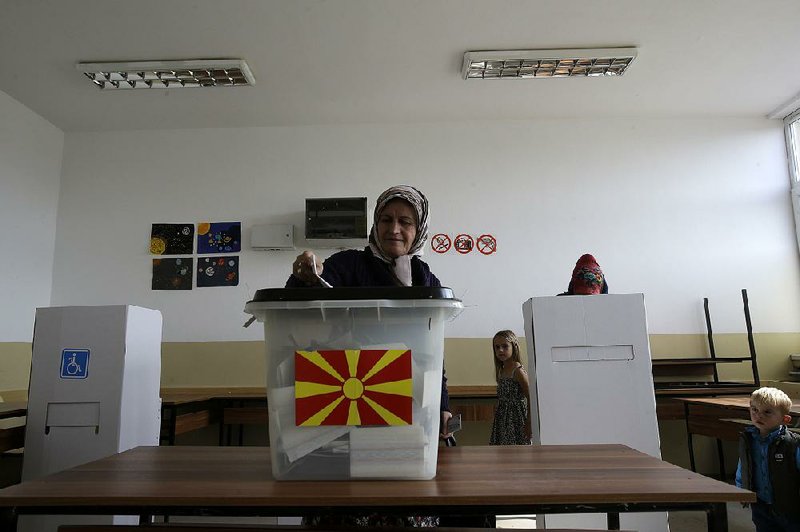SKOPJE, Macedonia -- A referendum on changing the nation of Macedonia's name to North Macedonia to pave the way for NATO membership attracted tepid voter participation Sunday, a blow to the prime minister who negotiated the deal and hoped for a strong message of support.
Macedonian Prime Minister Zoran Zaev nonetheless declared the balloting a "success for democracy and for a European Macedonia."
Results from 58 percent of polling stations showed 90.8 percent voter approval for the name change. The turnout appeared far smaller than the participation the government had encouraged.
Results from more than 97 percent of polling stations showed 91.3 percent of voters approving the deal. But turnout stood at just 36.8 percent, a far cry from the widespread support the government had hoped for.
Opponents of the deal had called for a voter boycott and started celebrating outside parliament before the balloting was done, saying the turnout marked a clear defeat for the government.
Nevertheless, Zaev declared the vote a success.
"The people made a great choice and said 'yes' to our future. It is time for lawmakers to follow the voice of the people and to provide support," he said. "There will be no better agreement with Greece, nor an alternative for NATO and the EU."
Zaev said he would seek to secure the required two-thirds majority of the 120-seat parliament by next week for the constitutional changes. If he fails, he said the only alternative would be to call early elections.
The deal reached in June intended to resolve a dispute dating from Macedonia's declaration of independence from Yugoslavia in the early 1990s. Greece, arguing that its new northern neighbor's name implied territorial ambitions on its own province of the same name, has blocked Macedonia's efforts to join NATO since then.
Under the June deal, the Greek government would drop those objections, opening the way for Macedonia to join the military alliance as well as the European Union.
Hristijan Mickoski, head of the opposition VMRO party, said the low turnout showed the referendum had failed.
"This today is a defeat not only for the agreement with Greece, but for the crime of those who are in power," he said.
However, the government had called the referendum consultative and non-binding, meaning it could interpret the outcome as a fair reflection of public opinion regardless of how many people turned out to vote. If the referendum were binding, the Macedonian Constitution requires a minimum turnout of 50 percent of eligible voters to be valid.
The question posed to voters was: "Are you in favor of membership in NATO and European Union by accepting the deal between [the] Republic of Macedonia and Republic of Greece?"
The deal with Greece has faced vocal opposition on both sides of the border, with detractors accusing their respective governments of conceding too much to the other side.
Supporters of the deal, led by Zaev, characterized Sunday's referendum as a linchpin of Macedonia's future prosperity, the key to its ability to join NATO and, eventually, the EU.
Djose Tanevski was among the early voters in Skopje, the Macedonian capital.
"I came here because of the future of our children, who should have a decent life, a life in a lovely country, which will become a member of the European Union and NATO," he said.
But others had no intention of voting.
"I'm disappointed with all that is happening with Macedonia," said 34-year-old Bojan Krstevski. "I cannot give up my Macedonian identity. I don't want to be North Macedonian."
The referendum has stirred strong interest in the West, with German Chancellor Angela Merkel and U.S. Defense Secretary James Mattis among top foreign officials in Skopje recently to back the "Yes" side.
Russia, however, is not keen on NATO expanding in a part of Europe once under its sphere of influence. Mattis said there was "no doubt" that Moscow had funded groups inside Macedonia to campaign against the name change.
The deal faces several more hurdles to become final. So far Zaev has pledges of support from 73 lawmakers for the required constitutional amendments -- seven short of the two-thirds majority of the 120-member parliament.
If the amendments are approved in Macedonia, Greece would then need to ratify the deal.
But Greek Prime Minister Alexis Tsipras faces political problems of his own. His governing coalition partner, right-wing Independent Greeks head Panos Kammenos, has vowed to vote against the deal, leaving Tsipras reliant on opposition parties and independent lawmakers to push it through.
Information for this article was contributed by Ivana Bzganovic and Nicolae Dumitrache of The Associated Press.
A Section on 10/01/2018
